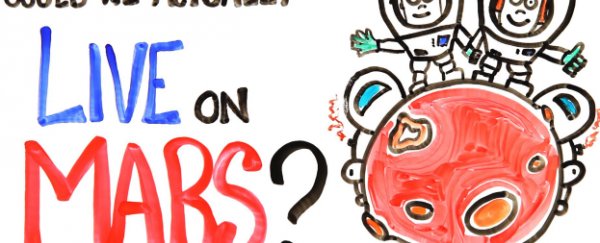In some ways Mars is a lot like Earth - its days are 24 hours and 37 minutes, and it once was covered in flowing rivers and lakes, just like our home planet. But unfortunately that's where the similarities end - in terms of warmth, atmosphere and gravity, Mars is a pretty, well, alien environment.
The latest episode of AsapSCIENCE explores exactly what it would take for humans to successfully colonise the planet, and does the science on whether it's something that could be achieved in our lifetimes. The short answer? Yes, but it would take a whole lot of new technology.
Let's start with the good news - contrary to popular belief, we'd actually have plenty of water to drink on Mars. It's estimated that there are 5 million kilometres of water frozen into the planet's ice caps, and if this was melted down it would cover the entire planet with an ocean 35 metres deep.
All this water could also help astronauts overcome another pretty serious problem - what to breathe. The Red Planet has a much thinner atmosphere than our own, and it's mostly made up of carbon dioxide. But by using electricity to split the available H2O on the planet into hydrogen and oxygen, we'd be able to create breathable environments, as the video explains.
And when it comes to food, research here on Earth shows that we'd definitely be able to grow crops such as tomatoes and carrots in the limited light available on Mars (although we'd need to get used to a vegetarian diet).
Unfortunately, other problems are harder to overcome - such as the fact that we'd be constantly bombarded with radiation blasting out from the Sun. And the reality that a mission to Mars can only be launched once every 26 months, so settlers would have a long time to wait for spare machine parts or extra supplies.
Combine this with the current ridiculously high price of space travel, and it's clear we'd need to develop some ambitious new technology before we can think about surviving on a new planet.
Bottom line? It's going to be really, really tough to live on Mars. But it's definitely not impossible. And, as this episode of AsapSCIENCE explains, the people who will create the tools we need to survive on the Red Planet may have already been born.
Watch the video above to find out more about the hurdles we need to overcome.
Source: AsapSCIENCE
